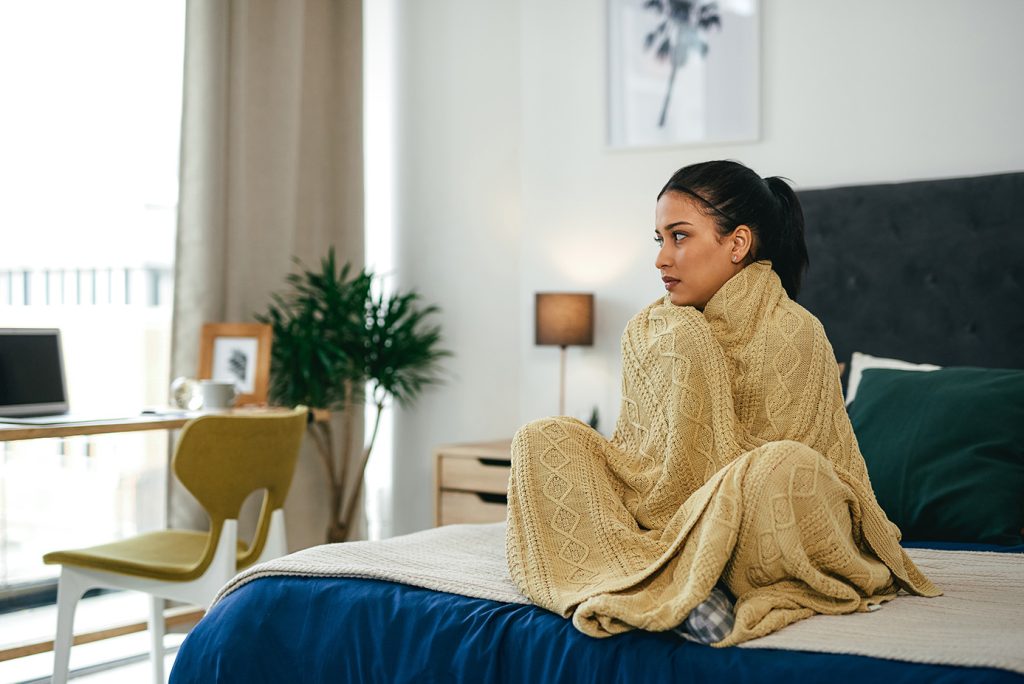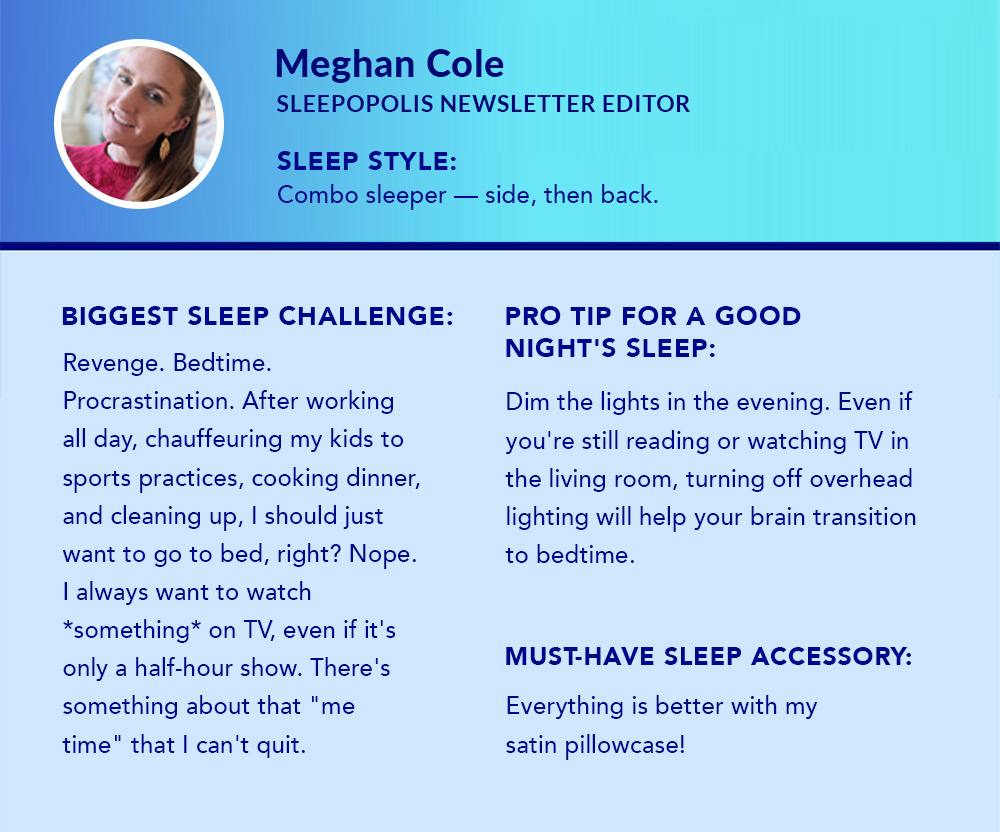
Beating Those Tough Winter Wake Ups
You’re not dreaming: Scientific research proves that it really is hard to wake up in winter — those chilly, dark morning have an impact! To find out why it feels downright impossible to drag yourself out of bed in the winter, we quizzed a sleep expert and took a good look at the research. Read on to understand what’s really going on during those cold winter mornings, how it’s affecting your sleep quality, and what you can do to make getting out of bed in the winter a little easier.
Why Is It So Hard To Wake Up In Winter?
There are a few things working against us when it comes to winter wakeups. Chief among them is the darkness, which messes with our circadian rhythm. “It’s definitely more challenging to wake up early in the winter, as there are fewer hours of daylight and the sun rises later,” says Kelly Murray, certified adult and pediatric sleep coach, FDN-P. “Sunlight is our body’s cue to start our daytime circadian rhythm. The later the sun rises, the later our body wants to wake up.” Without the sunlight to kickstart your system and suppress melatonin (the sleeping hormone) while increasing cortisol (the alert hormone), getting up early can hinge on pure willpower.
In the winter, colder temperatures also make it unappealing to leave the warmth of our beds. Body temperatures drop slightly as we get closer to bedtime in preparation for sleep and slowly rise in the morning to set us up for wakefulness. But if your room is freezing, you’re more inclined to stay snuggled up. And really, who can blame you?
Lifestyle habits, including nutrition and fitness, may also change when the days are colder and darker. If you’re skimping on fresh fruits and veggies, indulging in more sweets, and not exercising as consistently as you do when temperatures are warmer, you may find your energy levels nosediving. When the alarm goes off early in the morning, low energy can make it even harder to crawl out of bed.
Winter and Melatonin Production
According to the American Academy of Sleep Medicine, 34 percent of U.S. adults say they sleep more in the winter. It’s a reflection of adjusted circadian rhythms. “When there is less sunlight, our melatonin levels begin to surge earlier in the evening and stay high for longer in the morning,” says Murray. “As a result, we tend to go to bed earlier and sleep later.”
The lack of sunlight exposure has other drawbacks, too. “Not only does less sunlight mean more melatonin production, it also negatively impacts our Vitamin D and serotonin levels. Having sufficient Vitamin D and serotonin levels are critical for our mood. Deficiencies increase the risk of depression and anxiety.” That’s another thing that can make it harder to leave our beds.
Tips For Getting Out of Bed In The Winter
Unfortunately, we can’t hibernate all winter long, no matter what our circadian rhythm is doing. If you’re struggling to wake up in the winter, you might try a sunrise alarm clock, waking up with a morning workout, or turning the heat up shortly before it’s time to get up so you aren’t quite so tempted to stay in your cozy, warm bed. Check out our full list of tips below:
- Get a sunrise alarm clock. These dawn simulators are designed to gradually fill your room with artificial light that mimics dawn before the alarm starts softly singing. It may have a similar alerting effect to natural light and could help reset your circadian rhythm.
- Skip the snooze button. You may be tempted by five more minutes of sleep, but it’s really not worth it. In fact, those fitful, restless five-to-fifteen extra minutes may even make you feel more groggy when you finally do get up. If you find that snooze button irresistible, it can be helpful to remove the temptation entirely by putting the alarm far enough away that you have to physically get out of bed to turn it off.
- Program the heat to turn on 15 minutes before the alarm. It’s much easier to climb out of bed when your room isn’t freezing cold. Alternately, have slippers and a robe handy to put on as soon as you get up. And pro tip — wearing socks to bed may actually help you fall asleep faster because they help regulate temperature cycles. Plus, cozy socks will spare your feet from the cold floor come morning.
- Plan a morning workout. Sleep and exercise go hand in hand. If you’re struggling to fit in regular exercise, commit to morning workouts. This has the double benefit of getting you up and out the door and helping to keep your energy levels up — especially if you pay for classes in advance!
- Start the day by hydrating. Keep a glass of water on the bedside table and drink it down before you even get out of bed. Staying hydrated can help stimulate your system and make it easier to get moving. We know this one can come as a surprise, so we tested this tip ourselves — find out what Meghan thought of this tip below!
Our Tester’s Takeaway on Hydrating First Thing in the Morning

Meghan’s Review: It took me a couple of days to start feeling any real boost from drinking a glass of water first thing in the morning, but I’m glad I kept up with the experiment.
The first few nights, I took only 8 ounces of water to bed with me; I noticed no real difference in the morning. My alarm went off, I drank my water, and I still dragged myself out of bed. Once I upped that to 12 ounces, though, I felt like the extra hydration added a nice boost to my morning routine — the water honestly helped me wake up and feel a bit refreshed. I’m not an iced-water gal, so just room temperature water was enough to give me a little extra motivation to hop out of bed quicker and easier than without it.
Filling a water glass has now become part of my nightly routine, and there’s something about knowing that I have water within reach that makes me dread my alarm a little less in the morning.
The Last Word From Sleepopolis
Getting up early can be a struggle, and you aren’t crazy if you think it seems even harder in the winter. Your body’s circadian rhythm adjusts to the darker, shorter days, making you want to go to bed earlier and sleep in longer. Pair that with cold temperatures, and it’s definitely a time of year that’s conducive to sleeping in.


























